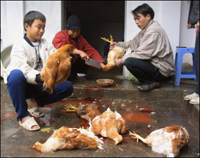Bird flu outbreak possible in Asia ahead winter

A top U.N. influenza called illnesses from animals "one of the greatest threats to the survival of the human race" and urged Asia to keep watch for a sharp rise in bird flu outbreaks as winter approaches.
"The northern winter seems to be a time when the risk of the disease in poultry increases, and it's partly to do with the fact that this virus quite likes cold weather," said David Nabarro, the U.N. coordinator for avian flu and influenza.
Birds migrating from Asia to the south and west in winter could also carry the disease to new areas, Nabarro told The Associated Press in Tokyo.
"When you get a high concentration of diseased birds, the risk of the virus coming into the human population seems to increase," he said. "Each time a human is infected with the virus, the possibility of the mutation to cause the pandemic flu comes along - and that's what we're on the lookout for."
Nabarro spoke after the Vietnamese government said Friday that dozens of ducks had died from bird flu in the country's south. Tests showed the birds had the lethal H5N1 bird flu virus strain, Vietnam's Department of Animal Health said.
The World Health Organization says the H5N1 strain, which has ravaged farms across Asia since late 2003, has killed at least 205 people worldwide, including 90 in Indonesia, 46 in Vietnam and 15 in China.
The disease remains hard for people to catch, and most cases have so far been traced to contact with infected birds. The latest human victim was an Indonesian woman who died of bird flu this month after handling dead chickens.
Experts fear, however, that the strain could mutate into a form that spreads easily between humans and trigger a global pandemic.
Nabarro said such diseases that jump from animals to humans pose one of the world's biggest health risks, and endanger regional economies.
He also said more people were eating meat as Asia's incomes rise, making it critical that livestock production is kept hygienic.
"Illnesses that come from animals are one of the greatest threats to the survival of the human race that we know. We can't predict when a new microbe is going to come along, and we can't predict what form it will take," Nabarro said.
"The pandemic, when it does come, will affect not just people's health, but it will also affect ... economic and social systems," Nabarro said.
He said a widespread and deadly East Asian SARS outbreak in 2003 "undermined the prosperity of a number of countries for a period of time."
Still, Nabarro said he was happy with Asian governments' response to recent outbreaks, saying they had responded "quickly and effectively."
He especially lauded China, saying it had used "rapid detection, quick response, and full involvement of the public."
H5N1, believed to spread along bird migration routes and through trade in live birds, has been found in birds throughout the Middle East and Europe, including Egypt, Britain, France and Germany.
Nabarro was in Tokyo for talks with Japanese officials on aid for influenza programs. The U.N. was scheduled to release a report assessing influenza risks and responses in the region in early December.
Subscribe to Pravda.Ru Telegram channel, Facebook, RSS!




